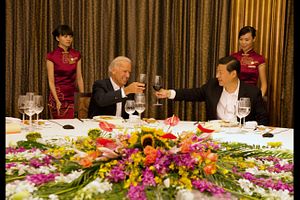On November 7, four days after the U.S. presidential election was held, American media outlets determined that Democratic candidate Joe Biden had secured enough votes in key states to give him a majority of the electoral college – thus securing his place as the next president of the United States. Despite incumbent President Donald Trump’s refusal to concede defeat and insistence (without any evidence) that there was rampant electoral fraud, most world leaders were quick to send their congratulations to Biden.
China’s President Xi Jinping was an exception.
At the Foreign Ministry’s daily press conference on November 9, spokesperson Wang Wenbin was asked why China’s government hadn’t issued a statement congratulating Biden on his win. Wang replied tersely that “we noticed that Mr. Biden has declared election victory. We understand the presidential election result will be determined following the U.S. laws and procedures.”
Officially, of course, U.S. election results are never fully sealed in the week after the election. Votes are still being counted in many states, and the electoral college (which actually casts the deciding votes) doesn’t even meet until December. But generally it is clear well before then who the ultimate victor is – and most governments, including China’s, don’t usually wait for the formalities. For example, Xi congratulated Donald Trump on his presidential election win on November 9, 2016 – well before states had officially certified the final results, much less before the electoral college had convened.
The obvious difference, of course, is that in 2016, Hillary Clinton conceded the election, while Trump has shown no indication of admitting defeat this time. Instead, he has promised to fight in the courts despite having little legal grounds to do so. Given that Trump would most likely need to see results in several states overturned to actually secure victory, his chances of avoiding a Biden presidency are extremely remote.
Notably, Wang didn’t specifically say that China was waiting on the lawsuits to peter out before acknowledging Biden as the winner. Instead, he said only that China “will follow international customary practices.”
But if custom is defined by the majority, it’s Xi who is the odd one out this time. Congratulations have poured in from Justin Trudeau in Canada, Emmanuel Macron in France, Angela Merkel in Germany, and even Boris Johnson in the U.K., Benjamin Netanyahu in Israel, and King Salman in Saudi Arabia, all strongly pro-Trump administrations. In Asia, Biden has been congratulated by Australia’s Scott Morrison, Japan’s Suga Yoshihide, Indonesia’s Joko Widodo, Malaysia’s Muhyiddin Yassin, the Philippines’ Rodrigo Duterte, Kazakhstan’s Kassym-Jomart Tokayev, and South Korea’s Moon Jae-in. Even Narendra Modi of India and Imran Khan of Pakistan found something to agree on: Biden is the next U.S. president.
So why the silence from China?
Perhaps the most important reason is that there is little to gain, and potentially a lot to lose, from Xi reaching out right now. Given the bipartisan focus on countering China, there is little hope that an early and hearty message of congratulations from Xi to Biden would move the scales even a bit in Beijing’s favor. Meanwhile, China has faced strident accusations of interfering in the U.S. election (based on scanty evidence). Against that backdrop, if Xi weighed in, China would risk being singled out as trying to tip the scales in Biden’s favor – even amid the large group of foreign leaders who have already sent similar messages. Best, then, to just stay out entirely.
Curiously, however, there seemed to be some reticence to even admit the election was over by the domestic state media. There was very little coverage of the announcement by Xinhua, China’s official state news agency. A one-sentence Chinese-language news release on November 8 noted that “according to the calculations of U.S. media, the Democratic Party’s presidential candidate Biden has won more than 270 electoral college votes.” It did not explicitly note that passing the 270 threshold meant Biden would be the next U.S. president. As of November 9, the U.S. election-themed articles highlighted on Xinhua’s website were older pieces from November 5 and 7 explaining that the count was still ongoing.
It may be that Beijing also sees some domestic advantage from pretending the result is still up in the air, allowing for more op-eds highlighting the messy nature of democracy.
Xi Jinping is joined by Russia’s Vladimir Putin, Brazil’s Jair Bolsonaro and Mexico‘s Andrés Manuel López Obrador in not issuing congratulations to Biden.
Meanwhile, Taiwan’s President Tsai Ing-wen had no such qualms. Referencing a Biden tweet congratulating her re-election in January, Tsai tweeted: “Now it is my turn to extend congratulations to @JoeBiden & @KamalaHarris on being elected President & VP-elect. The values on which we have built our relationship could not be stronger. I look [forward] to working together to further our friendship, & contributions to [international] society.”

































